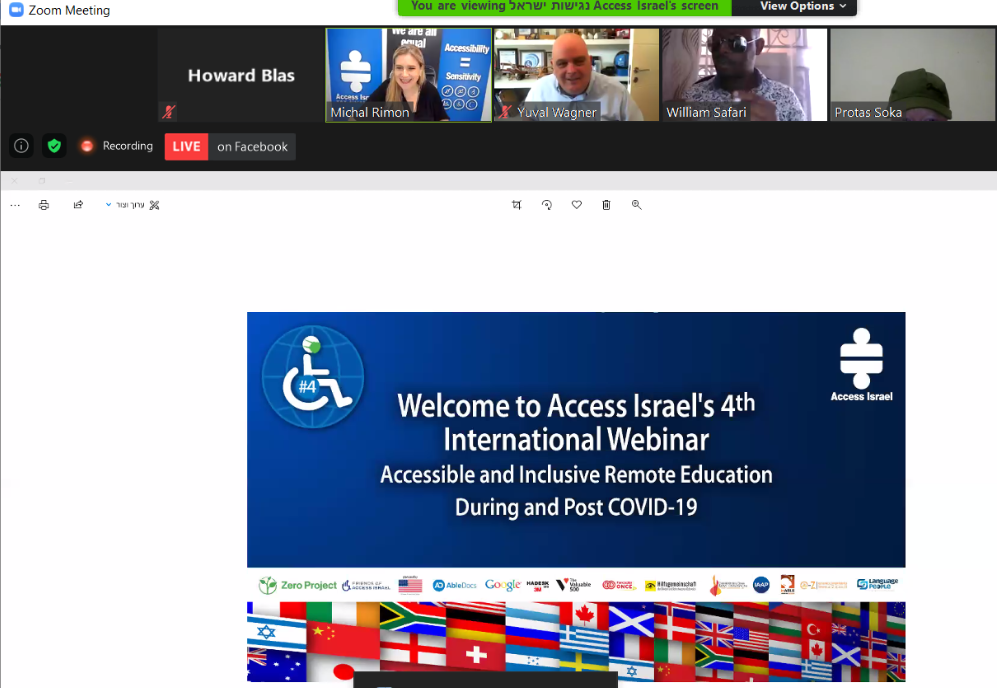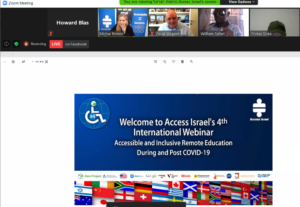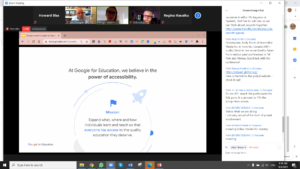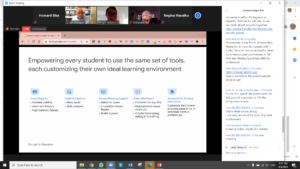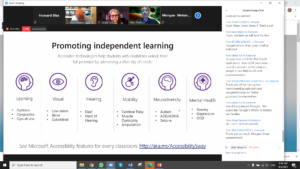Ironically, the 6-hour webinar hosted by Access Israel on Tuesday, entitled “Accessible and Inclusive Remote Education for Students with Disabilities during and post COVID-19,” was longer than the school day for many students around the world. And, unlike students around the world who are returning to in-person learning, the more than 500 participants and 23 presenters from over 75 countries (from Rwanda to Nepal!) didn’t even need to wear masks, wash hands frequently or maintain distance from peers and teachers! The content of the webinar was amazing, though it is admittedly difficult to sit for so long—and to absorb so much content.
I enjoyed learning from experts at Google and Microsoft and many other countries and organizations about accessibility features I never knew about—so many text to speech options, translation, captioning options and more—useful to ALL users. I hope to write more about these in future blogs. A quick example: read all about Microsoft Accessibility features here. There is useful info on Microsoft Accessibility Mobility Features, Hearing Features, Mental Health Features, Cognitive Features, Vision Features and Speech Features.
I particularly enjoyed hearing about special education in a range of countries—and how the countries supported learners with disabilities during the Covid pandemic. This is particularly relevant as all learners in all countries are in the process of returning to some form of education (in person, virtual, blended/hybrid). And this is complex even for learners without disabilities.
Racheli Abramson of Israel shared date on her country: there are 2,200,000 school students in Israel, and 209,000 are in special education. She reported that 170,000 of those students are integrated in to “standard classes.” I am fairly certain she reported that 67,500 are in special (self-contained) classes). Even as the country closed schools for most learners, Israel “kept special education institutions opened daily for face to face instruction, as possible—to maintain the familiar study routine.” They also tried to work with parents to answer their questions, find other solutions, etc. [I will need to confirm these numbers above as they sound very high—especially in light of confirmed numbers below for New York City].
Christina Foti, Deputy Chief Academic Officer, Division of Specialized Instruction and Student Support at NYC Department of Education, reports that there are 1.1 million students in the New York City school system and 300,00 have disabilities; 25,000 with the highest need are in what is called District 75. I was very impressed hearing Christina speak about how they partnered with Apple, who provided over 300,000 Ipods to students with the greatest need including those with disabilities and those in temporary housing. They also partnered with internet companies to make sure students could have internet service for their online learning.
In Austria, only 3% of students (3000 out of 1.1 million) are in special education. Andrea Reiger reported that they did not have internet access issues in Austria, but did rely on the Ministry of Education to provide 12 million Euros for Tablets.
Perhaps most enlightening was learning about education in Namibia, Located near Angola and Botswana in southwest Africa. Regina Hasiku reported that there are 3000 students with disabilities out of 850,000 total students. There are 11 special education schools in Namibia. Students did not have access to computers. The schools quickly realized that most had access to radio and newspapers so all lessons, including worksheets and booklets, were offered through these channels.
It is always exciting to meet with colleagues from around the world. The Access Israel Conference held in Israel each year is one amazing in person opportunity to learn from others. This year, there was no in person conference. Thank you, Access Israel, for so far offering 4 international webinars. In the words of founder, Yuval Wagner, they are “for sharing best practices and knowledge, in order to improve the quality of life, accessibility and inclusion of people with disabilities – leaving no one behind.”
Access Israel has done the hard part—creating a successful forum for bringing so many great people together. One request for next time–shorter sessions and more coffee and bathroom breaks!
